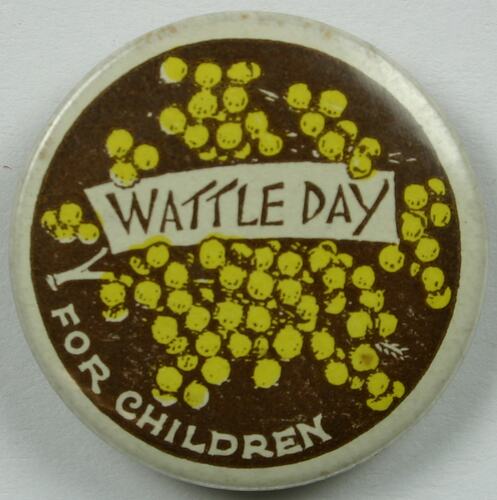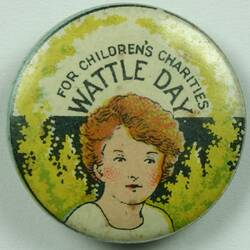Summary
Alternative Name(s): Button
Wattle Day badge featuring a yellow illustration of wattle, "Wattle Day for Children", manufactured by A.W. Patrick, North Fitzroy, Melbourne, circa 1914-1918.
Part of the Captain F.S. Laurie Collection. Captain Francis Stewart Laurie served in the Australian Army (regimental #SX619) 17 Nov 1939 - 26 Oct 1945. He was born in Burnside, South Australia in 1917, and enlisted at Woodside, South Australia at the age of 22. He served in Tobruk and New Guinea, and attained the rank of captain. He was in the 9 Division AASC (Australian Army Service Corps) at the time of his discharge. His uniform and other personal effects were donated to Museum Victoria.
The first 'national' Wattle Day was celebrated in Sydney, Melbourne and Adelaide on 1 September 1910. Wattle had become a symbol of Australia with the approach of Federation. It was particularly promoted by the Australian Natives' Association, established in Melbourne in 1871 as a non-partisan and non-sectarian friendly society for Australian-born, white men seeking to shape Australia's nationhood and identity. The ANA was a strong advocate for Federation and became an advocate for White Australia. It was a staunch supporter of trade protection and immigration restriction, and Prime Minister Alfred Deakin was a member. Public support for Wattle Day peaked during World War I, when it was a potent symbol of home for military personnel serving overseas, and a means of raising money for organisations such as the Red Cross. Beautifully designed Wattle Day badges as well as wattle sprigs were sold. The influence of Wattle Day waned as the 20th century progressed, but in 1992 the Governor-General declared 1 September National Wattle Day.
Physical Description
Circular pressed metal badge with a plastic cover on the obverse, a metal back and attached pin. Printed text and an illustration appears on the obverse in brown and yellow ink on a discoloured white background. In the centre of the badge, there is printed text on a banner in front of an illustration of a branch of wattle on brown circular background, and printed text appears below the wattle branch. This scene is enclosed within a white circular border. There is also printed text on the bottom edge of the badge in brown ink. The badge is discoloured and soiled. The reverse of the badge is tarnished and the original silver colour has partly worn away.
More Information
-
Collection Names
-
Collecting Areas
-
Acquisition Information
Donation from Mrs Betty Laurie, by Dec 1986
-
Manufacturer
-
Place & Date Used
-
Inscriptions
Printed, obverse, brown ink, "WATTLE DAY". Printed, obverse, brown ink, "FOR CHILDREN". Printed, bottom edge of the badge, brown ink, "A W.PATRICK. RAE ST. N.FITZROY."
-
Classification
-
Category
-
Discipline
-
Type of item
-
Overall Dimensions
5 mm (Depth), 23 mm (Outside Diameter)
-
Keywords
Community Organisations & Services, Fundraising, Wattle Day, World War II, 1939-1945

